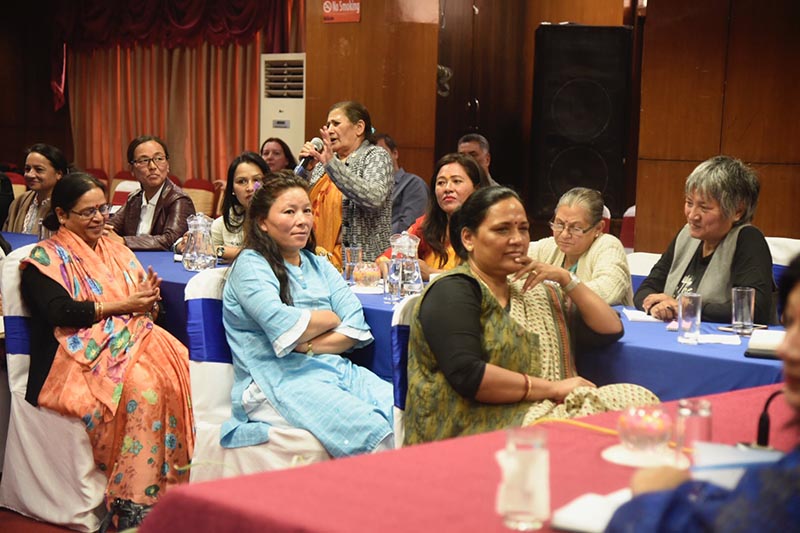When women in politics meet women in media
KATHMANDU: Women parliamentarians and other leaders in politics, on Sunday, discussed how people generally are less likely to recognise leadership qualities in women and stressed on the urgency to break this gender gap with female journalists, in Kathmandu.
During an interaction conducted by Sancharika Samuha, a forum of women journalists and communicators, along with the Election Commission and other organisations, Shivamaya Tumbahamphe, Deputy Speaker of the House of Representatives said that women's participation should increase and journalists should play a key role to stop women from being under-represented.
She opined that women in media are emerging with time and can see the rise in the ratio of path-breaking female journalists who can now actively involve in highlighting women-centric stories as women in media and politics are complexly intertwined and go hand in hand.
Samajwadi Party-Nepal (SP-N) leader Hisila Yami said, she is hardly ever questioned about politics or her expertise for that matter, leaving her with questions limiting to women and personal matters mostly. She urged to break this stereotype in the public sphere. She feels that when women raise their voice, they aren't always heard and are hardly encouraged by the government.
Female MPs feel that media plays an important role in shaping the perception of women in public.
Similarly, freelance journalist Aastha KC talked about how important it is for female leaders to answer tough questions. "Every time I make a call to speak to women leaders regarding an ongoing event in the parliament, I fail to get a straight answer and am turned away by saying they will inform me later," she said. KC added that reporting demands efficiency and journalists tend to focus on a quick source than gender.
With the hope of making women more visible in the media, Nepali Congress MP Lakshmi Pariyar complained about less coverage of women-related issues. She noted how celebrities manage to stay in news for days whereas other cheli-beti in various walks of life struggle to be heard.
Ashtalakshmi Shakya, Province 3 in-charge of Nepal Communist Party (NCP) said women issues are national issues and even men should understand and be involved in these matters, to which a reporter from Kantipur Media, Bidhya Rai suggested that it is important for women to speak for themselves to truly have an impact in the long run.
Women occupy 33 per cent seats in the Parliament and Rai put forward her opinion and asked Shakya, despite owing 112 seats, is it really important to involve men on issues to do with women when women MPs have an opportunity to voice their concerns out loud in public.
Former Member of the National Planning Commission Bimala Rai Poudyal said, if women stop writing about other women and let only men write about women issues, women will never be heard and there won't be transparency in perspectives.
Women in politics urged media to cooperate for the betterment of women politicians stating it is male voice that prevails. Most of them addressed their concerns regarding male-dominated media and how male counterparts are considerably at a forefront even while making key decisions in the parliament.
NC Chief Whip Sarita Prasai, NCP lawmaker Binda Pandey, MP Ram Kumari Jhakri, Amrita Thapa, Purna Kumari Subedi among others spoke at the programme.
Women from all forums are emerging with time and at this programme such women from two different and vital platforms came together to encourage politicians' ability to govern and journalists' to recognise the gender gap for better coverage.






